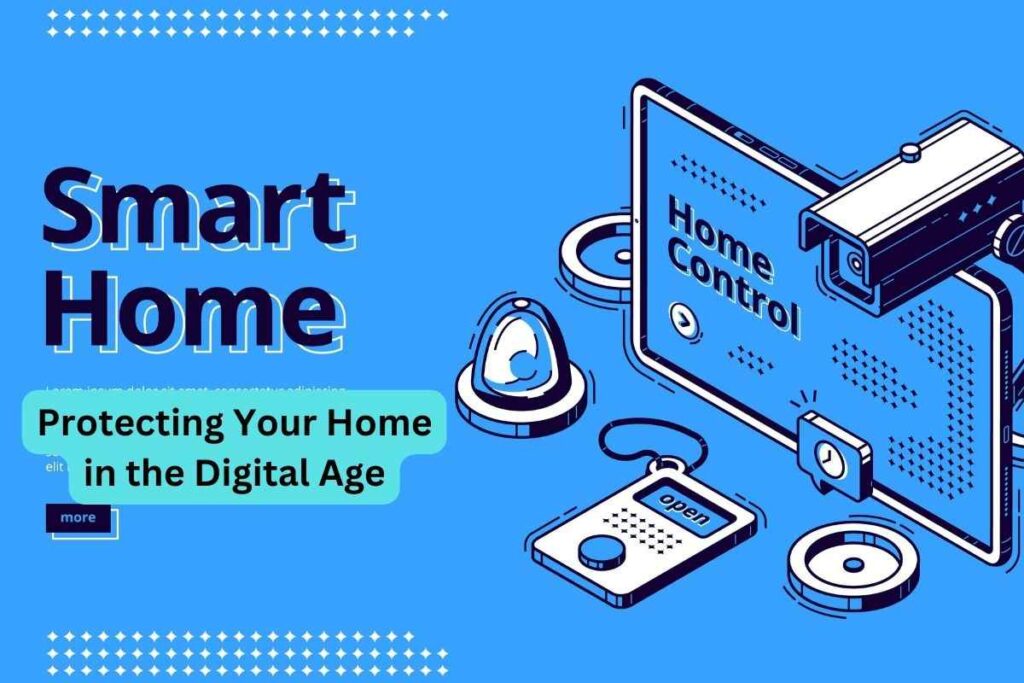Definition Of Smart Home Security Systems
Smart home security systems use cameras, door locks, motion sensors, and smart home hubs to monitor and manage home security remotely.
These gadgets can be managed remotely through a smartphone app and are internet-connected. Voice assistants, home automation, and home security systems may be combined.
Brief History Of Smart Home Technology
The first home automation systems were launched in the 1960s, spawning the smart house concept.
Early systems were costly and sophisticated, employed largely by rich homes. By the 1990s, smart home technologies had become cheaper and more widely available.
Wireless and IoT technologies transformed smart home technology in the 2000s. Smart home gadgets have become smaller, cheaper, more dependable, internet-connected, and remote-controlled. Modern home security systems use smart home technology, which has progressed.
Importance Of Smart Home Security Systems
Technology and security concerns have made home security systems more popular. Five reasons smart home security systems matter:
- Increased Home Security: Smart home security systems improve home security. Unexpected activity, such as a break-in, may be detected by these systems’ sensors, cameras, and alarms. Intruders are deterred by the presence of security cameras and alarms.
- Remote Monitoring and Control: Smart home security systems offer smartphone and other device monitoring and management. You can watch your cameras and sensors from anywhere and get notifications when your system detects odd behavior. Knowing your house is watched 24/7 provides you peace of mind.
- Integration with Other Smart Home Devices: Smart locks, lighting, thermostats, and security systems may be interconnected. It simplifies and improves your home by letting you operate various systems with one app or device. You may remotely lock your doors or switch lights when your security system senses activity.
- Insurance Advantages: Smart home security systems can get homeowner’s insurance reductions. These devices decrease break-ins and other security difficulties, reducing the likelihood of a claim.
- Increased Home Value: Smart home security systems boost house value. Smart home security systems provide contemporary, handy, and secure features that homeowners want. A smart home security system might boost your property’s value if you sell it.
How Smart Home Security Systems Work
Components Of A Smart Home Security System
- Sensors: Sensors can monitor doors, windows, and other openings.
- Cameras: Security cameras may be set both inside and outside to monitor and capture video of your house.
- Alarms: If any strange activity is detected, loud alarms may deter burglars and notify you and your neighbors.
- Smart locks: Smart locks enable you to remotely control entry to your house using a smartphone app or a voice assistant.
- Hub: A smart home hub links all your security system components and enables you to operate them all from one app or device.
Integration With Other Smart Home Devices
One of the most significant benefits of a smart home security system is its ability to interface with other smart home devices. This enables you to manage numerous home parts from a single app or device, making it more efficient and easy. You may, for example, combine your security system with the following:
- Smart lighting: You may program your lights to switch on when your security system senses activity, giving the appearance of someone at home.
- Smart thermostats: Programmable thermostats may save you money and energy since they adjust the temperature automatically when you leave or return home.
- Voice assistants: You can control your smart home’s security system and other connected devices with easy speech commands using voice assistants.
- Smart speakers: Listen to music, read the news, and manage your smart home all with one device: a smart speaker.
Advantages Of Using Smart Home Security Systems
- Increased security: Smart home security systems provide comprehensive security solutions, giving you peace of mind.
- Convenience: Remote monitoring and administration enable you to keep an eye on your house and security system from any location.
- Integration with other smart home equipment: Smart home security systems may be connected to other smart home devices, boosting your home’s efficiency and convenience.
- Insurance benefits: Several insurance companies provide discounts on homeowner’s insurance for homes that have smart home security systems, cutting your insurance costs.
- Increased property value: If you want to sell your home in the future, investing in a smart home security system may increase the value of your home and make it more desirable to potential buyers.
Types Of Smart Home Security Systems
DIY Systems
DIY security systems are for do-it-yourselfers. These systems are cheaper than professionally installed ones and have simple instructions.
DIY systems use easy-to-install sensors, cameras, and alarms that can be operated through a smartphone app. DIY systems need self-monitoring, which is one of their primary drawbacks.
Professionally Installed Systems
Security companies build and maintain professionally installed systems. These solutions cost more upfront but provide more protection and peace of mind.
Professional installation ensures system functionality. Professionally installed systems are monitored, so if an alarm goes off, the security provider will notify the police.
Monitored Vs. Unmonitored Systems
Monitored systems are linked to a professional monitoring service, which will notify you and the appropriate authorities if an alarm is activated.
This system provides more security and peace of mind since you know the authorities will be notified in the event of an emergency.
Unmonitored systems, on the other hand, are not linked to a monitoring service, and you will be responsible for monitoring the system yourself.
While unmonitored systems are less costly, they do not offer the same protection as monitored systems.
Features Of Smart Home Security Systems
Remote Access And Control: It is a crucial function of smart home security systems. Monitor your system from anywhere using a smartphone app or web browser. Get real-time alerts, activate and disable your system, and see live home video feeds.
- Motion Detection Sensors: Smart home security systems need motion sensors. These sensors can detect motion and notify your smartphone or other devices. Motion detection sensors may activate lights to make it seem like someone is home even when you’re not.
- Video Surveillance: Smart home security involves video surveillance. You can monitor your home in real-time, capture films, and get alerts for unexpected activity with high-resolution cameras. Some solutions enable you to chat to with people at your front door while gone.
- Smart Locks and Access Control: Smart home security includes smart locks and access control. Smartphone apps or voice assistants unlock smart locks remotely. Guests and service providers may use temporary access codes to get notifications while entering or leaving your home.
Frequently Asked Questions
How Do I Choose The Right Smart Home Security System?
Consider your requirements, budget, and tastes when choosing a smart home security system. Research several systems and compare features like remote access, motion detection sensors, and video surveillance. Decide if you want to DIY or expert installation and how much professional monitoring you want.
What Are The Potential Risks Of Using A Smart Home Security System?
Smart home security system hazards include hacking, data breaches, and privacy issues. Using a reliable security provider, using strong passwords, updating software, and reviewing privacy settings may reduce these threats.
Can Smart Home Security Systems Be Hacked?
It may be compromised. Software flaws and weak passwords let hackers in. Use strong passwords, a reliable security provider, and up-to-date software to reduce hacking risk.
How Much Does A Smart Home Security System Cost?
Smart home security systems’ prices vary on system type, features, and expert monitoring. Professionally installed systems cost over $1,000, while DIY systems cost $100 to $500. Monthly monitoring rates might be $10 to $50 or more depending on the monitoring level and features.
Conclusion
In conclusion, this security system includes many new features that increase security and peace of mind. Smart home security systems secure your house and family with remote access, motion detection sensors, video monitoring, and smart locks.
Consider your requirements, budget, and tastes when choosing a smart home security system. Professionally installed systems are more secure and convenient, while DIY systems are cheaper.
Hacking and privacy issues might arise with smart home security systems. Use strong passwords, a reliable security provider, and up-to-date software to reduce these dangers. Smart home security systems improve home security overall. Smart home security systems use cutting-edge technology to safeguard and reassure homeowners.







